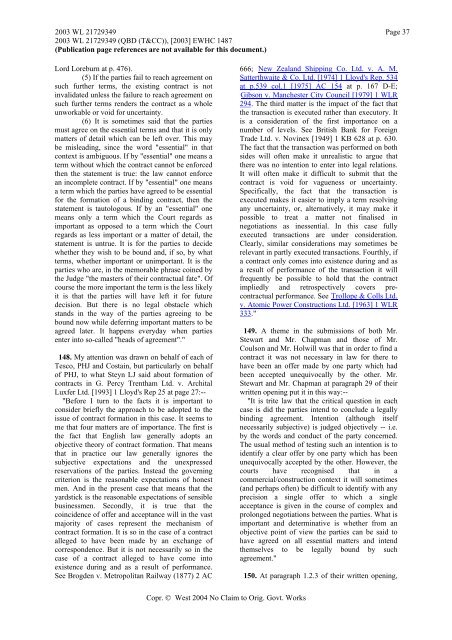Tesco v Constain - Thomson Reuters
Tesco v Constain - Thomson Reuters
Tesco v Constain - Thomson Reuters
Create successful ePaper yourself
Turn your PDF publications into a flip-book with our unique Google optimized e-Paper software.
2003 WL 21729349 Page 372003 WL 21729349 (QBD (T&CC)), [2003] EWHC 1487(Publication page references are not available for this document.)Lord Loreburn at p. 476).(5) If the parties fail to reach agreement onsuch further terms, the existing contract is notinvalidated unless the failure to reach agreement onsuch further terms renders the contract as a wholeunworkable or void for uncertainty.(6) It is sometimes said that the partiesmust agree on the essential terms and that it is onlymatters of detail which can be left over. This maybe misleading, since the word "essential" in thatcontext is ambiguous. If by "essential" one means aterm without which the contract cannot be enforcedthen the statement is true: the law cannot enforcean incomplete contract. If by "essential" one meansa term which the parties have agreed to be essentialfor the formation of a binding contract, then thestatement is tautologous. If by an "essential" onemeans only a term which the Court regards asimportant as opposed to a term which the Courtregards as less important or a matter of detail, thestatement is untrue. It is for the parties to decidewhether they wish to be bound and, if so, by whatterms, whether important or unimportant. It is theparties who are, in the memorable phrase coined bythe Judge "the masters of their contractual fate". Ofcourse the more important the term is the less likelyit is that the parties will have left it for futuredecision. But there is no legal obstacle whichstands in the way of the parties agreeing to bebound now while deferring important matters to beagreed later. It happens everyday when partiesenter into so-called "heads of agreement"."148. My attention was drawn on behalf of each of<strong>Tesco</strong>, PHJ and Costain, but particularly on behalfof PHJ, to what Steyn LJ said about formation ofcontracts in G. Percy Trentham Ltd. v. ArchitalLuxfer Ltd. [1993] 1 Lloyd's Rep 25 at page 27:--"Before I turn to the facts it is important toconsider briefly the approach to be adopted to theissue of contract formation in this case. It seems tome that four matters are of importance. The first isthe fact that English law generally adopts anobjective theory of contract formation. That meansthat in practice our law generally ignores thesubjective expectations and the unexpressedreservations of the parties. Instead the governingcriterion is the reasonable expectations of honestmen. And in the present case that means that theyardstick is the reasonable expectations of sensiblebusinessmen. Secondly, it is true that thecoincidence of offer and acceptance will in the vastmajority of cases represent the mechanism ofcontract formation. It is so in the case of a contractalleged to have been made by an exchange ofcorrespondence. But it is not necessarily so in thecase of a contract alleged to have come intoexistence during and as a result of performance.See Brogden v. Metropolitan Railway (1877) 2 AC666; HNew Zealand Shipping Co. Ltd. v. A. M.Satterthwaite & Co. Ltd. [1974] 1 Lloyd's Rep. 534at p.539 col.1 [1975] AC 154 at p. 167 D-E;HGibson v. Manchester City Council [1979] 1 WLR294. The third matter is the impact of the fact thatthe transaction is executed rather than executory. Itis a consideration of the first importance on anumber of levels. See British Bank for ForeignTrade Ltd. v. Novinex [1949] 1 KB 628 at p. 630.The fact that the transaction was performed on bothsides will often make it unrealistic to argue thatthere was no intention to enter into legal relations.It will often make it difficult to submit that thecontract is void for vagueness or uncertainty.Specifically, the fact that the transaction isexecuted makes it easier to imply a term resolvingany uncertainty, or, alternatively, it may make itpossible to treat a matter not finalised innegotiations as inessential. In this case fullyexecuted transactions are under consideration.Clearly, similar considerations may sometimes berelevant in partly executed transactions. Fourthly, ifa contract only comes into existence during and asa result of performance of the transaction it willfrequently be possible to hold that the contractimpliedly and retrospectively covers precontractualperformance. See HTrollope & Colls Ltd.v. Atomic Power Constructions Ltd. [1963] 1 WLR333."149. A theme in the submissions of both Mr.Stewart and Mr. Chapman and those of Mr.Coulson and Mr. Holwill was that in order to find acontract it was not necessary in law for there tohave been an offer made by one party which hadbeen accepted unequivocally by the other. Mr.Stewart and Mr. Chapman at paragraph 29 of theirwritten opening put it in this way:--"It is trite law that the critical question in eachcase is did the parties intend to conclude a legallybinding agreement. Intention (although itselfnecessarily subjective) is judged objectively -- i.e.by the words and conduct of the party concerned.The usual method of testing such an intention is toidentify a clear offer by one party which has beenunequivocally accepted by the other. However, thecourts have recognised that in acommercial/construction context it will sometimes(and perhaps often) be difficult to identify with anyprecision a single offer to which a singleacceptance is given in the course of complex andprolonged negotiations between the parties. What isimportant and determinative is whether from anobjective point of view the parties can be said tohave agreed on all essential matters and intendthemselves to be legally bound by suchagreement."150. At paragraph 1.2.3 of their written opening,Copr. © West 2004 No Claim to Orig. Govt. Works
















